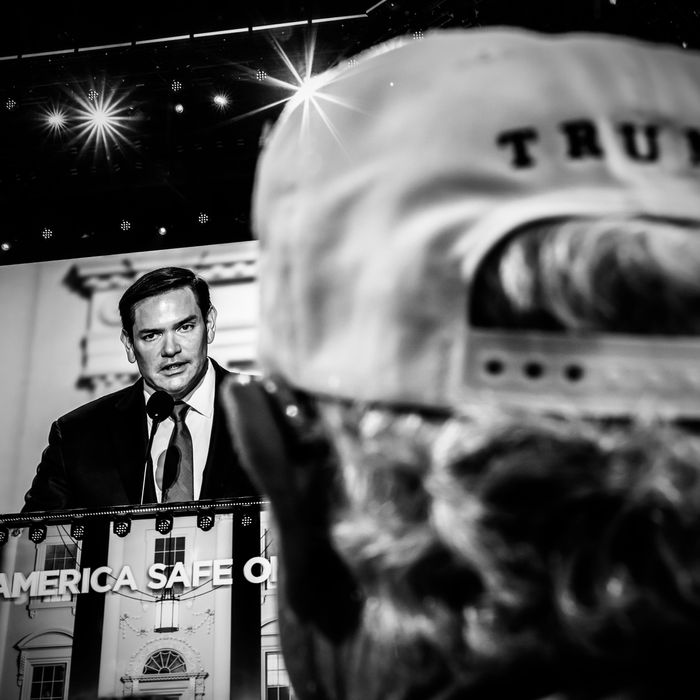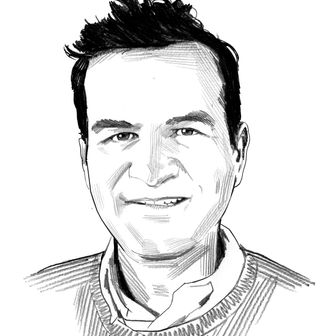
Back in January, Nikki Haley said that Donald Trump was “just toxic,” that he “lacks moral clarity,” and that he didn’t know the difference between right and wrong.
On Tuesday night, she told the Republican National Convention that “for the sake of our nation, we have to go with Donald Trump.”
Last October, Ron DeSantis mocked Trump for losing to Joe Biden in 2020 and needled him for using campaign funds to pay for lawyers in his many legal travails.
On Tuesday, he walked up to the stage and loudly proclaimed, “Let’s send Donald Trump back to the White House!”
The second night of the convention was full of Republicans who not only used to denounce Trump but said he represented a mortal threat to the party and the nation. “Utterly immoral” in the words of Ted Cruz (who began his speech by intoning “God bless Donald J. Trump”). A “con artist,” as Marco Rubio put it, whose supporters would have to one day answer for powering his rise. (On Tuesday: “Donald Trump has inspired a movement.”)
But if saying bad things about Trump were disqualifying, the Fiserv Forum would probably be empty. Even Trump’s running mate, J.D. Vance, once called him “America’s Hitler” and “cultural heroin” and said Christians supporting him needed to seek absolution.
While some of those who criticized Trump dismiss what they once said as a product of being caught in the heat of the moment during hard-fought primary campaigns, others, like Vivek Ramaswamy and Elise Stefanik (both of whom also spoke on Tuesday), had aired their moral reservations about the former president before competing against him, if they ran against him at all.
The presence of Vance here raises a question: If, eight years ago, you thought Trump was a wannabe authoritarian, an agent of chaos, or morally unfit to lead the nation, but you no longer think so, why did you change your mind? Calling someone the next Hitler is a serious charge. What has Trump done since then to make you realize you were wrong?
“I was certainly skeptical of Donald Trump in 2016, but President Trump was a great president and he changed my mind,” Vance told Fox News’ Sean Hannity on Monday night. Hannity did not press him on how exactly he so badly misread Trump. “I think he changed the minds of a lot of Americans,” Vance added.
In 2015, Trump — the reality-TV star and real-estate magnate — was seen as about as serious a contender for the GOP nomination as a dancing bear that sings show tunes. The 2016 convention nearly dissolved into chaos before eventually nominating him.
“It’s not that I didn’t like him,” said Randall Dunning, a Texas GOP official who has attended the past five Republican conventions and in 2016 supported Ted Cruz for president. “It’s this: We’ve had in the past a Republican Party that will put in people who are not what we call ‘movement conservatives.’ And they pledged to be conservative, but they get in and they RINO out. They start making deals with the Democrats, and the conservative wing of the party ends up feeling like we got our noses smashed up against the window with no say whatsoever. And I feared very much that’s what was going to happen with Trump.”
Dunning wore a large pro-life button on his shirt and said he had even come to see Trump’s baroque personal life as no longer a cause for concern.
“Trump was a product of New York Democrat society,” he said. “That’s where he came from. And you’ll notice most of his peccadilloes and all that were very common in New York and in New York Democrat society. He was beloved by the Democrats until one day he comes down the escalator and says he’s a Republican, and suddenly, he’s the Devil incarnate to Democrats.”
Trump made an unscheduled appearance at the convention on Tuesday night, arriving before Cruz spoke and sticking around long enough to hear Haley and DeSantis praise him. And although a large wall covering by the concession stands featured a quote from Trump — “I will be your retribution” — and despite his promise to exact revenge on his perceived enemies, he evinces a special joy when onetime enemies become supporters, especially when those who once declared him morally repugnant profess support.
Darrell Issa, the former California congressman who warned in 2016 that Trump’s nomination would lead to a wipeout for the GOP before endorsing him a few months later, couldn’t resist a dig at some of his past colleagues who had been more skeptical of Trump only to be rewarded with plum administration posts — figures like Mick Mulvaney and Mark Meadows. “I was campaigning for Trump while they were still on the fence,” Issa said. “Everyone thinks he holds grudges, but he’s proven that he doesn’t. He’s picked people that were on the other side as long as they can come in and work loyally for him.”
Donors and political operatives here, many of whom were not necessarily anti-Trump but at least would prefer that the Trump Era come to an end, said they were now mostly resigned his hold over the party. “Everyone knew that the party needed to become more populist, that it needed to make appeals to the working class,” said one operative who had worked on several Republican presidential campaigns in the pre-Trump past. “I don’t think anyone thought it would happen like this, but it had to happen and you are hearing from politicians who have largely reconciled themselves to that.”
Another major Republican donor who confessed to being alarmed at what some of Trump’s policy proposals — including his plans to increase tariffs and deport millions of immigrants — would mean for the economy, said four years of Democratic warnings that Trump would spell the end of democracy had left him inured to further dire predictions: “Think about it. Donald Trump was president for four years. He cut taxes, and that’s pretty much it. Did anything bad really even happen?”
And say this for Trump: If he has one genius, it is for jumping to the front of the parade and acting as if he’d been there all along. When the cultural vibe in the 1980s was Lifestyles of the Rich and Famous, he became an avatar of great wealth. When, at the end of the 1990s, Ross Perot’s Reform Party was having a moment, Trump explored running for president on a third-party ticket. A few years after that, as Barack Obama and the Democrats came to power, he changed his party registration to Democrat and sent appreciation notes to Nancy Pelosi. Two years later, as the Tea Party backlash took hold, Trump refashioned himself as a leading birther who regularly dialed up Fox & Friends.
If Vance rose to fame by explaining why, and lamenting that, dispossessed white Americans were finding meaning in Trump, becoming a regular on cable news and in lefty magazines only to refashion himself as a MAGA acolyte, it is hard not to imagine that Trump looks at this with grudging respect.
“That Donald Trump picked him, I actually think that says a lot about Donald Trump,” said Illinois congressman Darin LaHood. “I mean, the party has been transformed.”
More on 2024 RNC
- Photos: The Triumphalist Republican National Convention
- Donald Trump Cannot Even Pretend to Change Who He Is
- Trump’s Endless Speech, Hulk Hogan’s Shirt Rip, and Not Much Unity: RNC Recap






























